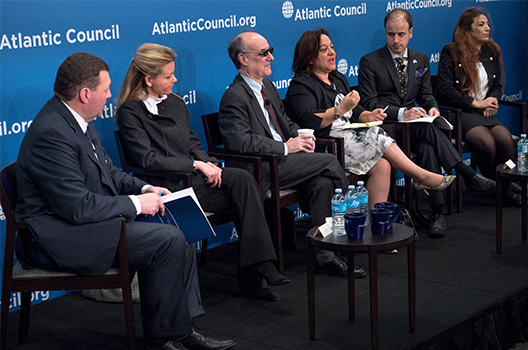 The Atlantic Council’s Rafik Hariri Center for the Middle East hosted a panel discussion on March 9, 2017 with Ms. Nebras Attia, human rights activist; Dr. Federica Saini Fasanotti, nonresident senior fellow at the Brookings Institution; Ms. Azza Maghur, senior lawyer at Maghur & Partners; Dr. Jason Pack, executive director of the US-Libya Business Association; and Amb.Jonathan Winer, former US special envoy for Libya at the US Department of State. Rafik Hariri Center Senior Fellow Dr. Karim Mezran moderated the discussion and Hariri Center Director Amb. Frederic Hof gave opening remarks.
The Atlantic Council’s Rafik Hariri Center for the Middle East hosted a panel discussion on March 9, 2017 with Ms. Nebras Attia, human rights activist; Dr. Federica Saini Fasanotti, nonresident senior fellow at the Brookings Institution; Ms. Azza Maghur, senior lawyer at Maghur & Partners; Dr. Jason Pack, executive director of the US-Libya Business Association; and Amb.Jonathan Winer, former US special envoy for Libya at the US Department of State. Rafik Hariri Center Senior Fellow Dr. Karim Mezran moderated the discussion and Hariri Center Director Amb. Frederic Hof gave opening remarks.
In his opening statement, Amb.Winer emphasized the need for reconciliation on the ground in Libya. He said that any rebuilding process must involve the most legitimate entities coming together to make a deal, such as the western Government of National Accord and the eastern House of Representatives, but that this is complicated by the struggle for legitimate power among many actors in the country. Winer urged the international community to align on Libya and end the practice of supporting clients or proxies based on outside actors’ respective agendas. He said that although US policy with regards to Libya is unlikely to change much under the Trump administration, it is important that the country maintain its resources and empower its economy.
Maghur presented an opposing perspective, saying that there is no legitimate entity at all in Libya. She said that while every actor in Libya has been affected by the civil war, divisions within Libya are more of a perception by the international community than they are a reality on the ground. In terms of the emergence of violent extremism, Maghur noted that extremism is not just a Libyan problem, and urged for the involvement of the entire international community in countering violent extremism. She said that in discussing extremism, it is crucial to discuss organizations other than the Islamic State.
Fasanotti opened by saying that all the players must rethink the course of reconstruction in Libya, and that patience is an essential ingredient to this process. She added that a top-down rebuilding approach is wrong because it overshadows the need for localization and effective state building. She said that until there are effective state-building measures in place, Libya will not be ready to host foreign embassies.
Attia also underlined the importance of local-based processes of reconstruction. She advocated for increased communication on the local level, because, at present, international stakeholders are only communicating with power holders in Libya. Attia also expressed the importance of empowering Libyan youth and providing them with more opportunities as a powerful mechanism to help combat extremism.
Pack addressed how alliances are shifting on the ground in Libya and how this has been compounded by recent clashes surrounding the country’s oil facilities in the Gulf of Sidra. He explained that the international community is split in its support for Libyan actors, and noted that this divergence of regional and international interests in Libya is contributing to a vacuum in the country. Pack also discussed Libyan institutions, including the position of the Central Bank of Libya, and the impact that the civil war has had on the country’s important financial institutions. He additionally emphasized the role that the private sector can play in providing solutions to the conflict in the country.
